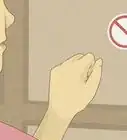This article was co-authored by Kirsten Parker, MFA and by wikiHow staff writer, Danielle Blinka, MA, MPA. Kirsten Parker is a Mindset and Action Coach based in her hometown of Los Angeles, California. She helps high achievers overcome stress and self-doubt. She specializes in increasing one's confidence and clarity by incorporating tools from positive psychology, mindful habit change, and self-regulation into her coaching. She is a Certified HeartMath Practitioner trained in Stress, Anxiety, and Intelligent Energy Management along with Emotional Intelligence and the Science of Self-Acceptance. She also holds an MFA from Yale University School of Drama in Stage Management.
There are 7 references cited in this article, which can be found at the bottom of the page.
This article has been viewed 16,935 times.
Whether you’re a parent or you work with teens, you likely know that teens will act disrespectfully sometimes. The best way to teach a teen to respect you is to model the behavior you want. Sometimes teenagers need to see respect in action to know how to act the same way. Additionally, working with your teen to set boundaries and rules is an important part of teaching them respect. When your teen shows disrespect, call out the behavior, ask them what they could do differently next time, and give a consequence, if necessary.
Steps
Modeling Respectful Behavior for Teens
-
1Show respect to adults and children so you’re a good role model. Teens learn by observing others, so they won’t understand how to give respect unless they see you doing it. Use a respectful tone when talking to others so your teen learns how to speak with respect. Additionally, don’t insult other people when you’re alone with your teen because it teaches them to devalue people.[1]
- For instance, don’t talk bad about your teen’s teachers or other parent in front of them. If you do, they'll think it's okay to disrespect authority figures.
- Don’t insult or berate other children, even if they’re in the wrong. Let’s say your teen’s friend insulted them. Say something like, “I heard what you said to Dylan, and it wasn’t appropriate. I expect you to apologize right now or you’re going home.”
Tip: You may accidentally disrespect someone in front of your teen. If this happens, point out what you did wrong and how you’re correcting it. For instance, let’s say you yelled at a store employee. Say, “What I did was inappropriate. I should have spoken kindly, so I’m going to apologize for my actions.”
-
2Manage your temper when you’re around your teen. While it’s normal to get angry or upset sometimes, it’s important to express your anger in a healthy way. Step away for a few moments if you need to calm down. Additionally, speak calmly and don’t use curse words or insults.[2]
- When you're feeling overwhelmed, take deep breaths and count to 10.
- If you scream and curse, it teaches your teen that it’s okay to behave this way when they’re upset.
- If you lose your temper, use it as a teaching moment. Acknowledge that you behaved badly and what you should do instead. You might say, “I lost my temper earlier and shouldn’t have yelled at you. Instead, I should have talked to you about what happened.”
Advertisement -
3Speak kindly, yet firmly, when disciplining your teen. When your teen makes mistakes, wait until you feel calm before you discipline them. Then, sit your teen down and discuss what happened. After you explain what they did wrong, discuss the consequences for your teen’s actions.[3]
- For instance, let’s say you caught your teen sneaking out and you feel like screaming at them. You might say, “Go up to your room right now. I’ll be in to talk to you soon.”
- When you go talk to your teen about what happened, say something like, “We have rules to protect you and you chose to break them. There are consequences for breaking the rules. Do you remember what they are?”
-
4Listen to the teen’s ideas and feelings so they feel heard. Your teen has a different perspective than you do, and they might feel disrespected if you don’t take their ideas into account. While you may not be able to give your teen what they want, listen to what they have to say.[4] Then, paraphrase what they said back to them so they know you understand. Address any concerns that they bring up so they understand that you aren’t just dismissing them.[5]
- For instance, let’s say your teen wants a later curfew. You might say, “It sounds like you feel that I’m treating you like a child and that your friends have more freedom. I understand that feeling, but it’s my job to protect you. You’re not old enough to stay out later than 9:00 p.m. without an adult, but we can discuss other ways to help you feel more independent.”
-
5Teach your teen how to regulate their own emotions. It's normal for teens to be emotional, and they might not have the tools to deal with their feelings. Help your teen learn how to recognize and name their feelings. Then, teach them how to express their feelings in a healthy way.[6]
- Say to your teen, "I can see you're upset. What are you feeling?"
- To help your teen express their emotions, you might help them start journaling or help them find a friend to vent their feelings to.
-
6Show your teen how to communicate well. Good communication can help your teen open up when they're going through a rough period instead of acting out. Spend time with your teen so you have a chance to talk to them. During your conversations, listen to what they have to say, validate their feelings, and encourage them to open up about tough topics.[7] Additionally, help them put their thoughts into words by doing role-play conversations, discussing media about teens, and talking about your own experiences.[8]
- Let's say your teen tends to bottle up their feelings. You might do a role-play conversation where you play an angry teen and they play the parent. This might help them learn to put words to their feelings.
- Similarly, you might watch your teen's favorite shows with them so you can discuss what's happening and how your teen relates to it.
Creating Boundaries and Rules for Teenagers
-
1Set boundaries for your teen so they know what you expect from them. Talk to your teen about what kinds of behaviors you think are respectful. Then, tell your teen how you expect them to treat you and what you consider to be your boundaries. This helps them understand how to respect you.
- For example, you might tell your teen that you won’t tolerate yelling, name-calling, or backtalk. You could say, “I expect you to use a respectful tone and kind words when you speak. Additionally, wait your turn to speak instead of interrupting someone."
-
2Be realistic when setting expectations for your teen. You probably want to protect your teen from making mistakes and likely want them to always make the best choices. However, no one is perfect, and expecting too much from your teen can be overwhelming for them. Talk to your teen about your expectations and how they feel about them. Additionally, be honest with yourself about your teen's strengths and weaknesses. Adjust your expectations to fit your teen's needs and abilities.
- As an example, let's say you're upset because your teen is always on their cell phone at dinner. You might prefer that they put their phone away and excitedly engage in conversation. However, it's unrealistic to set an expectation that they happily talk to you every day. Instead, you might tell them that you expect that they won't use their phone during dinner.
-
3Create consequences for violating the rules you set. Establish the consequences for disrespectful behavior before your teen makes a mistake. Choose a consequence that aligns with the severity of their actions. Explain the consequences to your teen when you discuss the rules with them.[9]
- For instance, your child might be required to apologize when they use unkind words with you. If they disrespect an authority figure, such as their teacher, they may be grounded for a weekend and also required to write an apology letter.
- Telling them the consequences in advance helps you tie the consequences to the specific behaviors you don't want your teen to do.
-
4Respect healthy boundaries set by your teen when it's appropriate. Allow your teen to set reasonable boundaries that make them feel respected. Honor these boundaries so that your teen knows you respect them. This teaches your teen that it’s important to respect boundaries.
- For instance, don’t violate your teen’s privacy if they’ve asked you not to search their bag or sort through their desk drawers.
Variation: Depending on the situation, you may occasionally need to violate your teen’s boundaries to keep them safe. For instance, you might need to check your teen’s phone to make sure they aren’t using apps that might be unsafe for them. In this case, talk to your teen about why you’re checking on them and listen to their feelings.
-
5Let your teen help create the rules so they have buy-in. Teens need rules to give them structure and help them make good decisions. However, teens often feel disrespected if they aren’t part of the rule-setting process. Ask your teen to help you create the household rules and consequences. This will help them feel like they're a part of the process.[10]
- Let’s say you want to create a rule about chores. You might say, “What are some ways you could help out around the house?” Then, ask, “What do you think should happen if you don’t do your chores?”
- If your teen suggests a rule or consequence that doesn’t work for you, explain why you disagree. You might say, “I think that 10:00 p.m. is too late of a curfew for someone your age."
-
6Separate the teen’s actions from who they are as a person. When your teen makes mistakes, make it clear that you have a problem with the behavior, not your teen. Point out exactly what your teen did wrong and what you expect them to do next time. Then, tell your teen that you know they’re better than their behavior.[11]
- Say, “Calling me a rude name is totally unacceptable. I expect you to speak to me with respect. While I’m upset with your behavior, I know you’re better than this. You’re a good person, and I love you.”
Correcting Disrespectful Behavior
-
1Show the teen respect even if their behavior is disrespectful. When your teen acts disrespectfully to you, it’s normal to want to mirror their behavior. However, being disrespectful back to them only reinforces their bad behavior. Instead, model the respectful behavior you want from them.
- Let’s say your teen has cursed you out. It’s totally normal to want to curse back at them. Instead, take a moment to count your breaths and calm down. Then, tell your teen something like, “This behavior is disrespectful and totally unacceptable. Go to your room until you’re ready to apologize.”
-
2Point out disrespectful behavior when it happens. Your teen is going to be disrespectful at times, so be ready to correct them. If they do something disrespectful, tell them what you saw them do and that it was inappropriate. Be specific so they understand what behaviors are unacceptable.[12]
- You might say, “I heard you raise your voice to your brother, and that was disrespectful,” or “I saw you teasing your friend, which is disrespectful.”
-
3Ask your teen what they could have done differently in the situation. When your teen is disrespectful, give them a chance to learn from the situation. Help them figure out what they could have done differently to be more respectful. Praise them when they give a good response.[13]
- Let's say your teen got angry that they weren't allowed to go out with their friends, so they stormed back to their room and slammed their door. When your teen has calmed down, you might ask, "What would have been a better response." Help them arrive at a response such as, "I could have used my words instead of storming off," or "I shouldn't have slammed the door because it disrespects your property."
-
4Enforce the consequences for your child’s behavior consistently. When your child shows disrespect, follow through on the consequences you set. Be consistent by addressing the behavior each time it happens. This will help your teen correct their behavior.[14]
- As an example, let's say your teen called their teacher a rude word. You might say, "Calling someone names is unacceptable. You're going to apologize to your teacher, and I'm taking away your Xbox for 1 week."
-
5Attend family therapy if your teen struggles with respect. If you’re having trouble getting your teen to be respectful, don’t despair! It’s possible your teen is just going through a rough time. To help bring your family together, go to family therapy to learn how each of you can make your family dynamic better. Your therapist can help your family communicate better and make positive changes.[15]
- Ask your doctor to refer you to a therapist or search for one online.
- Your therapy appointments might be covered by insurance, so check your benefits.
References
- ↑ https://www.psychologytoday.com/us/blog/the-moment-youth/201402/the-language-respect
- ↑ https://health.usnews.com/wellness/for-parents/articles/2017-04-19/teaching-teens-to-respectfully-interact-with-adults
- ↑ https://health.usnews.com/wellness/for-parents/articles/2017-04-19/teaching-teens-to-respectfully-interact-with-adults
- ↑ Kirsten Parker, MFA. Mindset & Action Coach. Expert Interview. 22 July 2020.
- ↑ https://www.psychologytoday.com/us/blog/the-moment-youth/201402/the-language-respect
- ↑ https://psychcentral.com/blog/techniques-for-teens-how-to-cope-with-your-emotions/
- ↑ https://childmind.org/article/tips-communicating-with-teen/
- ↑ https://www.understood.org/en/learning-thinking-differences/child-learning-disabilities/communication-disorders/10-ways-to-improve-your-high-schoolers-communication-skills
- ↑ https://www2.cortland.edu/dotAsset/1b1764f4-968a-4f29-b506-01257a542b39.pdf
- ↑ https://www.psychologytoday.com/us/blog/the-moment-youth/201402/the-language-respect
- ↑ https://www.psychologytoday.com/us/blog/the-moment-youth/201402/the-language-respect
- ↑ https://www2.cortland.edu/dotAsset/1b1764f4-968a-4f29-b506-01257a542b39.pdf
- ↑ https://www2.cortland.edu/dotAsset/1b1764f4-968a-4f29-b506-01257a542b39.pdf
- ↑ https://www2.cortland.edu/dotAsset/1b1764f4-968a-4f29-b506-01257a542b39.pdf
- ↑ https://www2.cortland.edu/dotAsset/1b1764f4-968a-4f29-b506-01257a542b39.pdf

























-Step-19-Version-3.webp)


















































